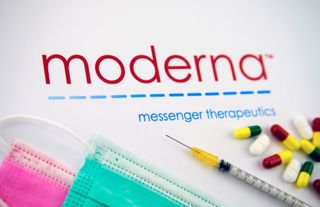The trial will enroll 30,000 people across the country.

The first large phase 3 trial of a candidate coronavirus vaccine in the U.S. began today (July 27).
The biotech company Moderna is conducting the phase 3 trial, called COVE (Coronavirus Efficacy), in collaboration with the National Institute of Allergy and Infectious Diseases (NIAID) and the Biomedical Advanced Research and Development Authority. The trial is expected to enroll about 30,000 volunteers across 87 different sites in the U.S., according to a statement. While phase 1 and phase 2 trials examine dosage, safety, common side effects and efficacy in a small number of people, the key to getting a vaccine approved is the phase 3 trial, which tests for vaccine efficacy while monitoring for adverse events in a much larger group of people, according to a previous Live Science report.
The first of those volunteers were given a shot early this morning, Dr. Anthony Fauci, the director of NIAID said today, according to The New York Times. Enrollment in the trial could be complete by the end of the summer and the first results of the trial might be available by November, Fauci said.
Half of the participants (all 18 years or older) will be given the candidate vaccine, called mRNA-1273 at a 100 µg dose and will be given a second 100 µg dose 28 days later. The other half will be given two doses of a saltwater placebo solution, 28 days apart. The researchers will follow up with participants up to two years after they receive the second dose to see if the vaccine protects them from developing COVID-19, according to clinicaltrials.gov. Study researchers will also look to see if any participants develop any adverse reactions to the vaccine.
Moderna's vaccine uses a technology that hasn't yet been used in any approved vaccines to date, but has several advantages, including being quicker and easier to manufacture than traditional vaccines, Live Science previously reported. The vaccine is based on a piece of genetic material called messenger RNA (mRNA) that teaches cells to build the coronavirus' spike protein, which the virus uses to invade cells. This will trigger an immune response against the spike protein, so that the immune system can quickly recognize and fight the coronavirus if it's ever exposed naturally.
Early results from a phase 1 trial consisting of 45 participants suggested that the vaccine prompted an immune response and appeared safe and generally well-tolerated, according to findings published on July 14 in The New England Journal of Medicine. Moderna's phase 2 trial is still ongoing, according to a statement.
The company announced on Sunday (July 26) that it would receive up to $472 million more from the federal government to help pay for the trial, as part of the U.S. government's Operation Warp Speed (an initiative that aims to deliver 300 million doses of a safe and effective vaccine by January of 2021, according to the U.S. Department of Health & Human Services), the Times reported.












Đăng nhận xét